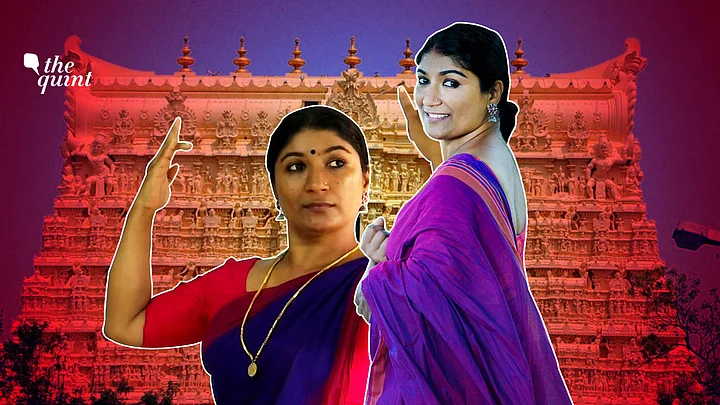Soumya Sukumaran, a 40-year-old Bharatanatyam dancer, is the second dancer to be barred from performing at Koodalmanikyam temple festival on account of being a non-Hindu. More, another famous temple – Sree Padmanabha Swamy Kshetram, Thiruvananthapuram – has “requested” her to either certify herself as Hindu or abstain from her performance which was scheduled for 13 April.
Sukumaran said that she will not perform at the temple as she cannot certify herself as a Hindu. She is a Christian, she said.
She told The Quint, “I have performed at Padmanabha Swamy temple earlier. There was no problem then. The temple asked me to give my scheduled performance a miss now, after Koodalmanikyam temple authorities barred me on account of being non-Hindu.” Sukumaran is the founder-director of Kalanjali for Arts, a performance school based in Thiruvananthapuram.
It is, however, not the first time that the dancer has faced a boycott. She is not allowed to receive religious sacraments of Malankara Orthodox Church, a Roman Catholic denomination, she said.
Church Boycott of the Dancer
Sukumaran has been training in both Bharatanatyam and Mohiniyattam since her childhood. As she was born in a Christian family, she was told by church authorities “not to indulge in idol worship.” In classical dance performance, Hindu gods are worshiped, the church held.
“To an extent what the church said was right because there is idol worship. But art has no boundaries,” Sukumaran said.
The artiste, however, did not give up dancing. While she left for Dubai after her marriage, she kept performing annually. “I used to perform at Dubai Malayali association stages,” she said. However, dance did take a backseat as the mother of three children kept to her household for close to a decade.
Sukumaran later embraced dance more fervently when she returned to Kerala, seven years ago.
“For the past seven years I have been performing at temples and also on other stages,” she said. Even now, the church has not warmed up to Sukumaran.
“I worry that my children may face problems if they want to adopt Christianity as they grow up,” she said. Her family members, including her husband who is a practicing Christian, has not faced any problems with the church so far. “The church has not boycotted others in my family. Only I am excluded. I have also not been going to the church, often,” she said.
Another Kerala dancer, VP Mansiya – who was a born in a Muslim family – has been facing boycott from both mosques and temples. Mansiya too was prevented from performing at Koodalmanikyam temple festival on account of being a non-Hindu.
On 1 April, expressing solidarity with Mansiya, three classical dancers –Devika Sajeevan, Anju Aravind, and Karthik Manikandan – who are Hindus by faith, boycotted the Koodalmanikyam festival.
‘Discrimination Rampant’
Sukumaran said that the temple ban, that has affected both Mansiya and herself, is but one among many in a series of discriminatory practices that classical dancers have to face. From ageist bias to discrimination based on skin tone, several social mores affect classical dancers, she said.
At her dance school, for instance, dance programme organisers show preference for younger women, within the age group of 18 to 25 years, she said.
“Women with darker skin tone are not preferred as the programme organisers ask for fair women,” she rued. On account of her age, Sukumaran too has been facing discrimination. “As they look for younger women, I have this added burden of looking young. As I look young for my age, I am sometimes spared of this bias,” she explained.
Sukumaran said that there should be more “secular stages” for performing classical artistes.
“I, for one, do not belong to just one religion. I think I have taken in all that is good in all the three religions – Christianity, Islam, and Hinduism. Why should I not perform in secular spaces where I am welcome?” she asked.
For Sukumaran, whose father was a Hindu before he adopted Christianity, Hinduism is not an alien religion. In her dance, she has had no qualms about praising Hindu gods.
“I think, as classical dance is rooted in Hindu tradition, one imbibes some Hindu religious practices too. I have never had any problem with this as I love dance that much,” she said. While this stand might not have gone down well with her church, Sukumaran is troubled by Hindu temples' open bias. “I am worried that I may lose more temple venues,” she said.
Kerala temples, which come under the state’s endowment department, have not unanimously banned non-Hindu performers.
However, in most temples in the state, non-Hindus are not allowed entry – a rule which is now extended to non-Hindu dancers who want to perform on temple premises.
VP Mansiya too has been asking for secular stages for classical artistes. Sukumaran said, “Political parties should take up this demand, which has come from both Mansiya and me. People of different religions should not be banned from performing classical dance.” The state’s endowment department has agreed to look into the current crisis that non-Hindu classical artistes have been facing.
(At The Quint, we question everything. Play an active role in shaping our journalism by becoming a member today.)
